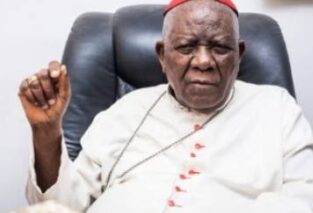(Revised and reproduced from Le Lien: Nkeng-Shalom, # 0001 of July 2001, pp 17-18).
Ask any ordinary Cameroonian if they think that we, as a people, can win the war against bribery and corruption and the instant answer is likely to be a categorical NO!! For proof, they would inevitably draw sustenance for their argument from outside sources, notably Transparency International, which awarded our country, on two successive occasions, the unenviable title of “The Most Corrupt Country in the World” in 1998 and 1999. So it would seem we are doomed; or, are we? I have had two revealing experiences over the past two months, which have shown me that the battle against bribery and corruption is perhaps not a lost one – at least not yet. One experience is negative, the other positive. Let me start with the negative one.
I recently bought a used car from a French expatriate in Douala. The first step is for the police to validate the sale certificate for change of ownership. When the former owner and I walked into a police station, I saw the two policemen on duty quickly exchanging knowing looks. What immediately came to my mind, and I was not wrong, was that they had seen a French man from whom they could extort money.
After carefully scrutinising the document and our identity cards, one of them calmly informed us that his boss would not even look at the document without “something” for his “carburant”. The French chap looked at me with a smile on the corner of his lips. And how much was that “something” for the boss’ “carburant’? he asked. “Five thousand francs, absolutely nothing less,” came the well-rehearsed response.
My immediate instinct was to reject his offer outright, although I did not know where else to go without having to pay the boss’ “carburant”. However, the French chap, eager to sell me his car, quickly pulled out a five thousand franc note, which quickly disappeared in a drawer. The policeman then affixed a stamp on the document, took it into an inner room and returned a few minutes later with his boss’s seal of approval on it.
When I asked the French fellow why he was so quick to pay the money without even putting up an argument, he looked at me with something close to pity in his eyes and said that he knew the Cameroonian police only too well, having spent nearly five years here. “Arguments don’t help”, he said as he handed me the sale certificate, wishing me good luck with my new car.
My next stop was at the tax office for the value of the car to be assessed. I was told a sum of 1000 francs had to accompany the document for stamp purposes. I happened to have a two thousand-franc note with me. The young man, who took the money, said he did not have any change. And, by the way, he continued with a smile, could “patron” not just let him have the change for a bottle of “beer”? “Why should I leave you my money?” I asked with a frown. Leaning over, he said, almost in a whisper, that he could make it possible for me to have the document back that same afternoon rather than the following week. Seeing that his argument did not impress me, he grudgingly gave back my change, and I could hear the young lady, whose desk was not far from his, grumbling about apparently rich-looking people who could be so stingy!
At the transport office, where the ownership document called “carte grise” was to be established, the woman who attended to me claimed I had come three minutes too late. Did I not know that documents should not be deposited later than 11:30? “And look at the time you’re coming with yours; it’s 11:33,” she said, pointing to her watch. Then, as if speaking to herself, but loud enough for me to hear, she grumbled about how hard she worked and no one ever thought of giving her a “beer”. “This ‘beer’ business is a serious one in this country,” I thought to myself. I then committed a grave error by loudly asking her if she wasn’t being paid for her job. For an answer, she skipped off her seat as if she had just sat on a pin, and walked away from her desk over to a colleague’s at the corner and, as I turned round to leave, I heard them making wry remarks about how stingy some people could be in this country.
“Et regarde même sa tête chauve-là », (“And look at what a bald head he has!”), I heard her friend launching an attack against my bald head, which she did not seem to like at all. As if a bald head was anything to be ashamed of!
A ray of hope
From these simple examples, one could conclude that bribery and corruption have indeed made their home in the very lowest strata of our society. But then the following two experiences have made me think twice about generalising the extent to which this cankerworm of bribery and corruption has eaten into our mores. Ironically, they involved policemen, notorious extortionists of money from poor drivers on our highways.
Just outside Nkongsamba the other day a policeman pulled me to stop and requested to see my car’s road-worthiness document, commonly called “visite technique”. I remember that when this document became a mandatory part of car documents in Cameroon, the official rate for obtaining it was a thousand francs, but no one would issue it to you in Douala for less than four times that amount. I remember having to cross the Mungo to Buea where the government-mandated amount of a thousand francs was still being strictly adhered to.
However, the said paper, strangely enough, was not among my car documents. That seemed like an ideal opportunity for the heavily armed policeman to extort money from me in exchange for my freedom. But, to my astonishment, he merely lectured me briefly on the importance of that document, which proved that my vehicle had been inspected and shown to be worthy of a place on our poke-marked roads! Then, he bade us good-bye, advising me to drive slowly so as to arrive home safely with my family. My wife and I thought we were dreaming.
Just only a few days later, another policeman stopped me in Douala and asked for my car documents. I was driving my wife’s car and it was only then that I realised my wallet with my driver’s licence was in my own car that was in the garage. My confusion must have convinced the young man that I was indeed telling the truth about having my licence elsewhere. Even then, I still expected him to book me, as it would have been his right to do.
But instead the young police officer merely gave me a short lecture on the importance of always ensuring that I had my licence in hand before driving. And with that, he handed back my wife’s car documents and cautioned me to drive carefully.
Could these two instances only be considered isolated cases? Or am I right to conclude from them that a degree of morality is finally making its way, albeit agonisingly slowly, into our police force that is notorious for extorting money on our roads sometimes for fictitious crimes? Two golden opportunities for policemen to ask and receive a bribe and they seemed to turn their back on them. The battle against bribery and corruption is perhaps far from being won, but it does not seem to me to have been entirely lost either. There seems to be a ray of hope at the horizon.
Douala, May 12, 2005


